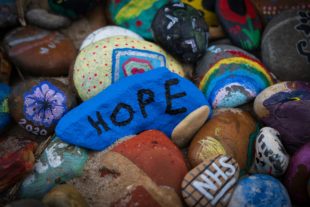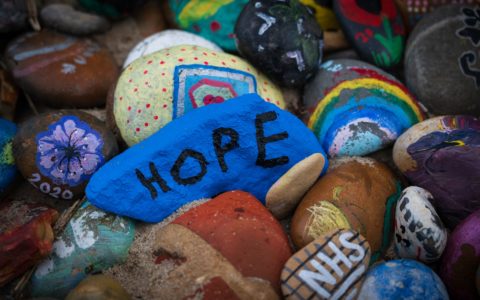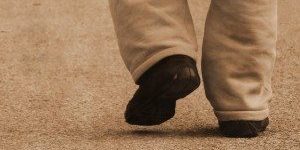Faith and Recovery: Facts from a Christian Counselor
Christian Counselor Spokane
A new study led by sociologist Dr. Brian Grim of Baylor University and published in the Journal of Religion and Health looks at the role of religious and spiritual faith in preventing and recovering from substance use disorder (Faith Counts, 2019). At any given time, there are twenty million Americans afflicted with a substance use disorder (SUD). And tragically, each year, about 158,000 die from alcohol or drug-related deaths. However, as we head further into National Recovery Month, one of the most effective tools to prevent and/or recover from addiction is often overlooked – faith. And when it comes to long-term recovery, faith-based programs are a driving force.
 The study found that 73% of substance abuse treatment programs incorporate spiritual components such as twelve-step programs. And congregations, through their support of recovery programs, supply $316 billion in savings to the U.S. economy every year, the study shows.
The study found that 73% of substance abuse treatment programs incorporate spiritual components such as twelve-step programs. And congregations, through their support of recovery programs, supply $316 billion in savings to the U.S. economy every year, the study shows.
“Belief, Behavior, and Belonging: How Faith Is Indispensable in Preventing and Recovering from Substance Abuse” is the second in a series of studies from Faith Counts, a nonprofit, multifaith organization aimed at promoting the value of faith. “In our review of hundreds of studies and extensive data, we found that religious beliefs, behaviors, and belongings significantly reduce risk of substance use and significantly help recovery,” states Grim.
Grim also emphasizes, “while in the latest Gallup survey only 46% of Americans think that religion can answer today’s problems, the reality is that religion provides answers for one of today’s biggest problems – addiction.” Part of the misperception revealed by Gallup is that fewer people are affiliated with religion today, resulting in less experience with faith and its positive impacts.
Indeed, the study concludes that the decline in religious affiliation presents a growing national health concern because the growth of disaffiliation is concentrated among Millennials and young adults, who are also the highest percentage of any age group to have a substance abuse disorder. “In a sense, the antidote is being rejected by the very people who need it most,” said Grim.
The study looked at several types of data to see if there is any connection between religiosity and recovery and what it found was remarkable: Those with strong religious beliefs are as much as eight times less likely to use illegal drugs, and as much as five times less likely to binge drink.
Nearly 90% of studies find that faith reduces alcohol abuse risk and 84% of studies show faith reduces drug abuse risk, according to Grim’s research, while less than 2% show that religion contributes to substance use disorders.
Religion and spirituality – which the study refers to collectively as faith – are exceptionally powerful, integral, and indispensable resources in substance abuse prevention and recovery. Religious beliefs, practices, and ministries not only provide succor and solace to those in need; they offer tangible, valuable resources that can help prevent and address substance abuse.
Regarding the current opioid crisis, Grim is careful to point out that the study is primarily about prevention and long-term recovery from alcohol and certain types of drug addiction. He says, “It is important to note that the opioid crisis presents a different and unprecedented set of challenges that require a unique approach to treatment for substance use disorder that may include medication assisted treatment.” Grim also adds, “Indeed, I want to be very clear that we are not conflating recovery from alcohol and other narcotics with addressing the opioid crisis.”
While overall medical intervention for SUDs is life-saving and critical, this study shows that faith organizations are uniquely capable of supplying the “wrap-around” care and community necessary for long-term recovery. Kerry Troup, communications director for Faith Counts, states, “We at Faith Counts see this study as yet another positive proof point of the tremendous social good that individuals and organizations of faith provide for society.”
The research shows that the efficacy of faith includes not only the behaviors people engage in (or don’t engage in) because of their faith and the support people find in belonging to faith communities but also people’s religious and spiritual beliefs. (Faith Counts, 2019).
 America is the most medically advanced nation in the world. Cities across the country are home to the most sophisticated hospital and health care complexes and equipment. Our physicians’ training has given us the finest medical professionals. Yet clergy and physicians, religion and science are too often ships passing in the night.
America is the most medically advanced nation in the world. Cities across the country are home to the most sophisticated hospital and health care complexes and equipment. Our physicians’ training has given us the finest medical professionals. Yet clergy and physicians, religion and science are too often ships passing in the night.
When we separate the worlds of medicine and spirituality, we deny a host of individuals help that may aid their recovery and ease their pain especially for substance abuse and addiction. One need only listen to the eloquent voices of recovery as they speak about the role of God and spirituality in their healing processes.
The CASA report, which includes unprecedented surveys of clergy and heads of schools of theology, documents the enormous power of God, religion, and spirituality in preventing and treating substance abuse.
- Adults who do not consider religious beliefs important are more than one-and-a-half times more likely to smoke, more than three times likelier to binge-drink, almost four times likelier to use an illicit drug other than marijuana, and more than six times likelier to smoke pot than adults who believe that religion is important.
- Adults who never attend religious services are three times more likely to smoke, more than five times likelier to use an illicit drug other than marijuana, almost seven times likelier to binge-drink, and almost eight times likelier to smoke pot than those who attend religious services at least weekly.
- Teens who do not consider religious beliefs important are almost three times more likely to drink, binge-drink, and smoke, almost four times likelier to use marijuana, and seven times likelier to use illicit drugs than teens who believe that religion is important.
- Teens who never attend religious services are twice as likely to drink, more than twice as likely to smoke, more than three times likelier to use marijuana and binge-drink, and almost four times likelier to use illicit drugs than teens who attend religious services at least weekly.
- College students with no religious affiliation are more likely to binge-drink than those who identify themselves as Catholics or Protestants.
- The 33% of prison inmates who take part in religious activities show lower rates of recidivism and recidivism is due almost entirely to drug and alcohol abuse.
According to Califrano (2002), religion and spirituality can be important, sometimes determinative, companions to the treatment and recovery process. Many recovering alcoholics and addicts attribute their motivation to seek treatment and their ability to maintain sobriety to their religious beliefs and the support of a community of believers. Individuals who attend spiritually based 12-step programs such as Alcoholics Anonymous and Narcotics Anonymous, in addition to receiving treatment, are likelier to maintain sobriety. Individuals in successful recovery commonly display greater levels of faith and spirituality than those who relapse.
Given the significance of religion in prevention and treatment, the most troubling discoveries of the CASA study are two profound disconnects: one, between the extent to which clergy see substance abuse as a problem among congregations they serve and their lack of knowledge and training in the area; the other, between the importance of God, religion, and spirituality for effective treatment and the medical profession’s failure to tap into this resource when treating substance abusers and addicts.
The Clergy Disconnect
Of the priests, ministers, and rabbis surveyed, 94% of front-line clergy and 98% of theology school presidents consider substance abuse and addiction an important problem in their congregations. Yet only 12.5% of clergy received any training about substance abuse during their theological studies.
Only 36% said they preach a sermon addressing the issue more than once a year. (I have attended Mass more than 4,000 times during my life, and I can remember only once hearing a priest discuss the subject in a sermon, the Rev. Thomas Bennett of Our Lady of Perpetual Help in Washington Depot, Conn.)
These survey responses are deplorable since alcohol and drug abuse are so tied to child and spousal abuse, violent crime, rape, teen pregnancy, sexually transmitted disease, family breakup and divorce, school dropout and failure, debilitating accidents, and job loss – all problems that clergy confront every day among their congregations.
 This past December, the Vatican’s Pontifical Council for Health Care Workers released a 200-page manual on drugs and drug addiction. Four years in the making, the manual focuses on the church’s role in prevention and treatment. It promotes youth programs that discourage drug use and calls upon church workers to be positive role models.
This past December, the Vatican’s Pontifical Council for Health Care Workers released a 200-page manual on drugs and drug addiction. Four years in the making, the manual focuses on the church’s role in prevention and treatment. It promotes youth programs that discourage drug use and calls upon church workers to be positive role models.
It outlines suggestions for church-sponsored treatment programs and even describes in detail the effects of commonly used drugs. Members of the clergy are urged to listen to their parishioners’ concerns, and parents are encouraged to talk to their children about alcohol and drug abuse.
The document, seeing substance abuse and addiction for the severe problem it is, finds that experiments conducted in certain countries to liberalize or legalize drug use have been disastrous and condemns legalization as a policy of despair. The Vatican publication’s clear recognition of the importance of spirituality in prevention and treatment is a wake-up call for Catholic clergy.
The Provider-Patient Disconnect
Standing in sharp relief is the lack of recognition among health care providers, especially psychiatrists, psychologists, and other mental health professionals, of the importance of God, religion, and spirituality to treating patients struggling with substance abuse and addiction. Only 40% to 45% of mental health practitioners believe in God. Only 37% of psychiatrists responded affirmatively to the question.
If it were scientifically proven that the use of a spiritual intervention (e.g., prayer) improved patient progress, would you perform that intervention? Only 57% of psychiatrists would recommend that a patient consult a member of the clergy. Sixty-five% of psychiatrists report that religious and spiritual issues were rarely or never included in their training.
For a sense of the chasm between these mental health care providers and patients, consider these facts: 95% of Americans believe in God; 79% believe that spiritual faith can help people recover from disease including addiction, and 63% think that physicians should talk to patients about spiritual faith.
The Combination Opportunity for Recovery
Clergy are a barely tapped resource in preventing and treating substance abuse and addiction. Priests, ministers, rabbis, imams, and other religious leaders should become more engaged in addressing this problem; they should preach about substance abuse issues and incorporate prevention and recovery messages into their ministry.
Many individuals, especially Catholics and some Protestants turn to their parish priest or minister for help in dealing with substance abuse problems. Schools of theology and seminaries – Protestant, Catholic, rabbinical, and others – should educate their students to recognize the signs of substance abuse and deal with them. Clergy should familiarize themselves with treatment services in their communities.
Archbishop Michael J. Sheehan of Santa Fe is showing the way. He has held a forum on drug abuse in four cities in New Mexico and last November issued a pastoral letter on the feast of All Saints setting out action plans for individuals, young persons, families, parishes, and the archdiocese based on the good news that people who are enslaved and blinded by drugs [including alcohol] can be freed through the amazing saving grace of Jesus Christ.
This remarkable spiritual leader urges parishes to keep a list of treatment centers and their phone numbers handy for referral purposes when the need arises. Archbishop Sheehan sees substance abuse as the number one health problem in New Mexico and is mounting a program that sets an example for every archdiocese of how to combine the power of the spiritual and the scientific.
 Psychiatrists and other mental health providers are of course free to hold agnostic and atheistic beliefs, but all should be better informed about the potential for God, spirituality, and religion to help prevent and treat substance abuse and addiction. They should learn of the spiritual and religious resources available in their local communities and how to take advantage of them.
Psychiatrists and other mental health providers are of course free to hold agnostic and atheistic beliefs, but all should be better informed about the potential for God, spirituality, and religion to help prevent and treat substance abuse and addiction. They should learn of the spiritual and religious resources available in their local communities and how to take advantage of them.
Health care providers should not shy away from discussing their patients’ spiritual needs and desires; they should be prepared to refer patients to appropriate clergy or spiritually based programs to aid their recovery. Perhaps the head of some local chapter of a mental health organization, like the American Psychiatric Association, will take a cue from Archbishop Sheehan’s outreach effort in New Mexico.
A better understanding by the clergy of the disease of alcohol and drug abuse and addiction together with a better appreciation by the medical profession, especially psychiatrists and psychologists, of the power of God, religion, and spirituality to help patients with this malady offer a gold mine for prevention and treatment that can help millions of Americans and their families.
For many individuals working to shake the shackles of addiction and hang on to sobriety, sound advice might well be to work at it as though everything depended on you and pray as though everything depended on God. That is not bad advice for priests and physicians as well. At least one archbishop, Michael J. Sheehan of Santa Fe, has taken it to heart.
Action Plan by Archbishop Michael J. Sheehan
What You Can Do
As an individual
- Frequent the sacraments
- Reach out to the addicted
- Stop using drugs or abusing alcohol and seek help
- Advocate improved resources in your neighborhoods
As a young person
- Learn about illegal drugs and alcohol abuse
- Avoid friendships with drug and alcohol abusers
- Join parish youth groups
- Go to Sunday Mass
As a family
- Stay involved, eat together, do things together
- Have fun without alcohol and drugs
- Forbid illegal drugs in the home or at family celebrations
- Use alcohol moderately or not at all
- Do not tolerate drugs in your schools
- Pray as a family
As a parish
- Speak about substance abuse in homilies
- Provide professional counseling and support groups
- Open parish facilities to Al-Anon, A.A., and N.A.
- Keep a list of treatment centers
- Provide a youth minister and youth group activities
ReferencesCalifano, J. (2002). Religion, science, and substance abuse. Available online: https://www.americamagazine.org/issue/360/article/religion-science-and-substance-abuse
Faith Counts (2019). Research Shows Correlation between Faith and Recovery: Key findings: faith reduces risk, helps Long-term recovery, saves lives – and billions of dollars in U.S. economy. Available online: https://www.nadadventist.org/news/research-shows-correlation-between-faith-and-recovery
Photos:
“Happy Family”, Courtesy of Drew Gilliam, Unsplash.com, CC0 License; “Reading the Bible”, Courtesy of Jessica Delp, Unsplash.com, CC0 License; “Hope on the Rocks”, Courtesy of Nick Fewings, Unsplash.com, CC0 License; “Fairy Light Heart”, Courtesy of Fadi Xd, Unsplash.com, CC0 License





